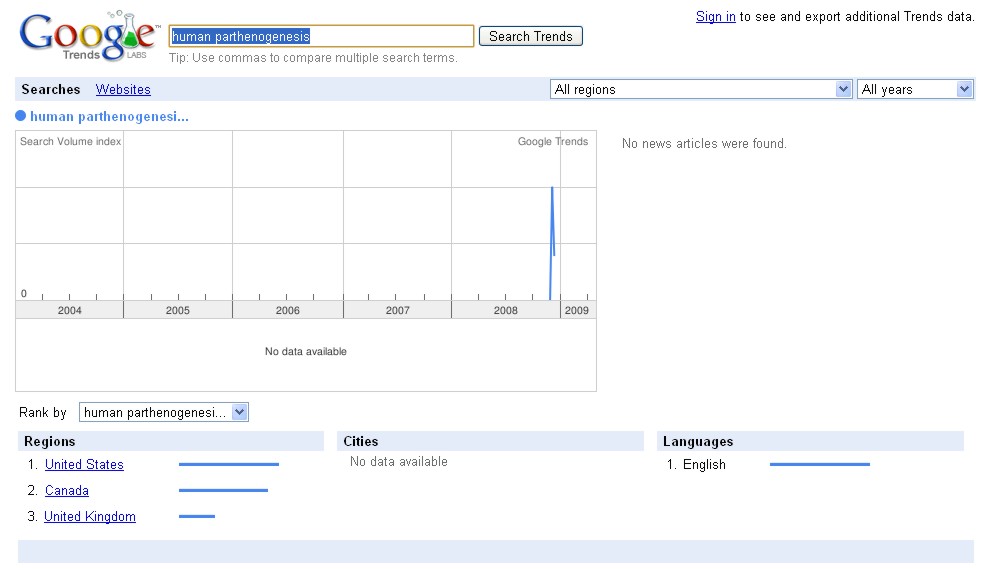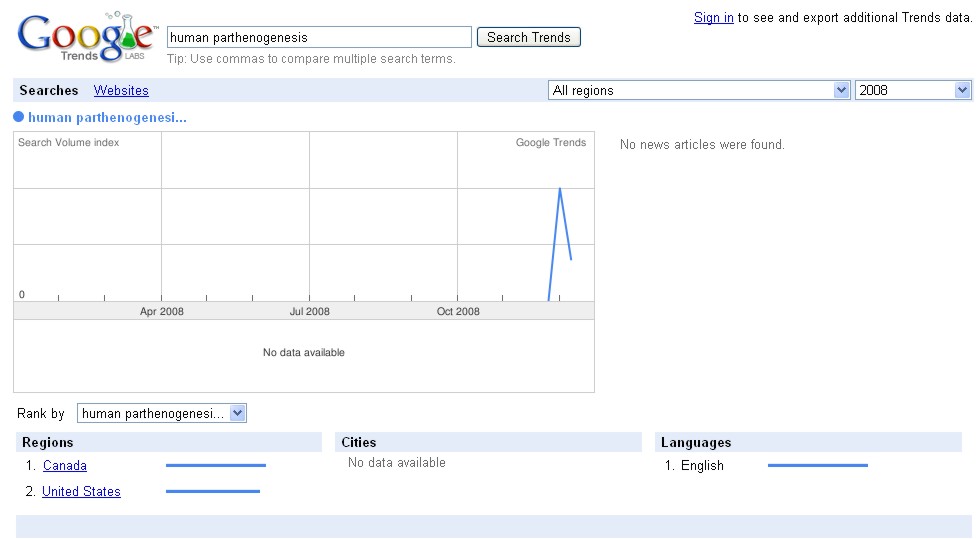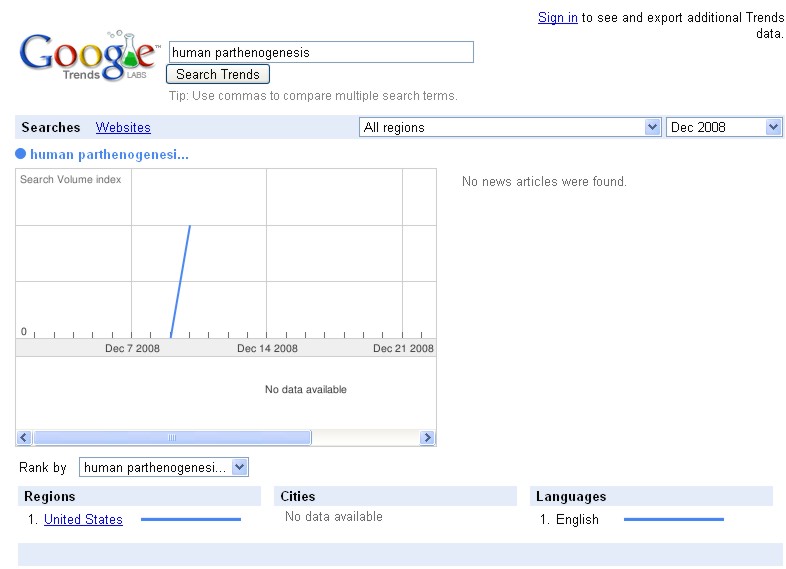Google Trends lets you delve into the human search behaviour (using Google off course!) on the internet circa 2004.
Can TV mold opinions? Can TV ads directly impact online behaviour? Well here is some startling proof of that!
It starts with an episode (“Joy to the World” Season 5, episode 11) of ‘House’ the wildly popular Sherlock Holmesian medical series ,in December 2008. So what is special about this episode? Well, like all good television shows, when it’s Christmas time the writers put in the extra hours to come up with a credible holiday spirity edge to the show. House being no different, has the main character Dr. Gregory House take on extra clinic duty (which he usually goes great lengths to avoid) talking to a female patient complaining about headaches.
House in his inimitable style deduces that the woman is pregnant, a claim that she strongly denies because she and her fiance are ‘virgins’. To cut the story short, House convinces the ‘to be’ husband and the wife, that this pregnancy was the result of parthenogenesis, {—-Parthenogenesis is an asexual form of reproduction found in females where growth and development of embryos occurs without fertilization by a male. In plants, parthenogenesis means development of an embryo from an unfertilized egg cell, and is a component process of apomixis. The offspring produced by parthenogenesis are always female in species that use the XY sex-determination system, as in humans.
Parthenogenesis occurs naturally in some invertebrate animal species (e.g. water fleas, aphids and vertebrates (e.g. some reptiles, fish). Parthenogenesis has been induced in mammals (rabbit cells) but no successful experiments with human parthenogenesis were reported till 2007, when discredited South Korean scientist, Hwang Woo-Suk, unknowingly contributed a major breakthrough to stem cell research and produced the first human embryos resulting from parthenogenesis. It is highly doubtful that artificial human parthenogenesis would be used to reproduce humans. Induced parthenogenesis in mice and monkeys often results in abnormal development. This is because mammals have imprinted genetic regions, where either the maternal or the paternal chromosome is inactivated in the offspring in order for development to proceed normally. A mammal created by parthenogenesis would thus have double measures of maternally imprinted genes and lack paternally imprinted genes, leading to developmental abnormalities if any were present in the genes of the mother. As a consequence, research on human parthenogenesis is focused on the production of embryonic stem cells for use in medical treatment, not as a reproductive strategy. Source: Wikipedia, Scientific American —} thereby saving the woman from embarrassing explanations.
So House does his good deed for Christmas and has the husband convinced that he and his future wife have been witness to immaculate conception or is now a virgin mother. The wife thankful for the deception sends House a gift a few days later, ensuring that he wins a bet with Wilson (a.k.a Dr. Watson)
This subject of parthenogenesis or immaculate conception would obviously make believers salivate at the very possibility, but more importantly the credulous way the news is delivered and given the ‘faith’ that people have in House’s diagnosis, the idea seems to have lept of the television and into peoples minds.
The rest of the post relates to internet behavior…so you can give it a skip if you’re not a web marketer,
Below is the data as given by Google Trends on searches for the phrase “human parthenogenesis”
 The above data is for all years starting 2004 (Google Trends data is available only post that year)
The above data is for all years starting 2004 (Google Trends data is available only post that year)
 Data for 2008
Data for 2008

Google Trends Data on searches for Human Parthenogenesis in the month of December 2008
9 December 2008 was the original air date for this episode. It is clearly evident from the chart above that viewers rushed to their computers and logged on to the world wide web to confirm their suspicions and to understand parthenogenesis. A quick Google search even today for the key phrase “human parthenogenesis” will yield results that go something like “Is human parthenogenesis possible? i saw this is on “House” today…
If Google was nice enough to share real numbers with us, we’d have an estimate of the number of tv viewers that became searchers. Would that data be important for people who are advertising websites/products on tv? We certainly think so!

HUMAN PARTHENOGENESIS, VIRGIN BIRTH, PANDORA’S BOX
It is said that Buddha’s mother conceived her son when in a state of blissful meditation under a banyan tree. Mary conceived Jesus in more or less the same way. It’s also been said that Leonardo Divinci, Joan of Ark, Moses, one of our Saint Catherine’s, Moses, (floating down a river in a basket?) Zoroaster and scores more geniuses, visionaries and healers throughout history came about this way. If many of the lower species can and do conceive parthenogenetically I don’t think it’s too shocking to assume that humans can too. Based on this fact alone I can’t imagine why scientists aren’t more curious. A hundred years ago the famous biologist, Jacques Loeb realized that: “The Male is not necessary for reproduction. A simple physio-chemical agent in the female is enough to bring it about.” Though no mammals have been known to have given birth parthenogenetically, Jacques Loeb got monkey embryos to fertilize through various means like electrical fields and saline solutions etc.
In the early 70’s I read and wrote a review for a book about the Ojibwa or Chippewa people. (Sorry, I can’t remember the title.) The author spent a decade re-searching oral stories from the Ojibwa’s old traditional speakers that existed before the coming of the Whiteman. One story was that wise-women of the tribe looked for certain young maidens that possessed grace, intelligence and compassion. Sometimes a candidate for conceiving and giving birth this way wouldn’t show up for a generation or two. Nevertheless, these wise-women kept an eagle-eye open for her. When found, men were not allowed to court her. When she reached the age of fertility, her first period, she was instructed to fast for several days and, if willing, was required to dance around a fire in a sacred women’s lodge built far away from the village. This ceremony occurred while she was ovulating. Ideally a state of bliss or ecstasy was reached during which, according to hidden wise women knowledge, it would be possible for her to conceive and give birth in the “old Way”. They also knew that a child born this way would be blessed with gifts of healing, clairvoyance or leadership. The Great Spirit would give to the child whatever tools the tribe might be in need of. I believe this is what happened among The Essenes along The Dead Sea over 2,000 years ago. Jesus was the result. It’s my guess that hey planned it. Also, I might venture to say that this “old way” of conceiving and giving birth was considered a no-no during a time when patriarchy was firmly established. Was this why King Herod felt so threatened, enough to try and have all the new born males put to death in his kingdom?
It’s known that the law of parthenogenesis results in the birth of females only. Let’s assume, until we know absolutely, that this holds true for species other than human, for there is a visionary power us humans possess. The Sanskrit term for it is Kriyashakti or, in short, shakti; the mysterious power of thought which enables us to produce external, perceptible, phenomenal results by its own inherent energy. Any idea will manifest itself externally if one’s attention is deeply concentrated. If a woman envisions a boy it’s quite possible she will give birth to one. “In the Mother Cell begins all living things. The Creative Principle is feminine. The highest divine mystery is Brahamana, the feminine of Brahma.” (according to Hindu mythology) If I haven’t scared the reader off by dipping into religious lore, one might ask the biological reason for the presence of the hymen in women. I believe only one species of whale has a hymen but it is to keep sea-water out. Among us humans the hymen remains a “medical mystery”. Some folks think it’s there merely as fodder for comedians. Is it there because Nature, the great conservative, has a higher form of conception and birth in mind for women? One might also inquire about dermoid cysts—-or certain types of them. Looking up dermoid cysts in Chambers Medical Dictionary, under Medio-logical Records, one finds; “dermoid cystic growths; embryonic growths or tumor-like formations found in women which are of congenital origin, containing evidence of being dejecta membra, or the remains of pregnant growths, in the embryonic fetal period of gestation, somewhat akin to the primary state of being with child.” Some of these dermoid cysts, sometimes mistaken by surgeons for tumors, but really are embryos, are similar in all respects to the products of female gestation, containing bones, hair, teeth, flesh, glands, portions of the scalp, face, eyes, ribs,—–in short, all the organs of the human body—-what else could they be but virgin embryos in the process of development? They’ve been known to appear in young girls from 8 to 16, that have their hymens intact. Unbeknownst to them, one of their eggs had parthenogenetically been fertilized and then had stopped developing and, typically getting trapped in their fallopian tube, had to be removed, as the failed embryo had become toxic. There is reason to believe that parthenogenesis was the primordial form of re-production for all life, while sexual generation (epigenesist) arose later as a result of inferior environmental and nutritive conditions resulting in diminished fertility. In other words, males develop in order to insure the survival of the species.
Anthropoid apes, our closest biological cousins, have a monthly period while in captivity and on a artificial diet. When returned to their natural habitat and diet they will bleed in the Spring and Fall like most mammals. Back in 1969 I used to live at Hippocrates Health Institute, in Boston, where everyone drank wheatgrass juice, ate raw sprouts, fruits, nuts and vegetables and nothing else. That means, no bread, grains, meats, or dairy products. The root philosophy at Hippocrates is that “Life Comes Only From Life”. After a month or two on this living food diet some women would have their periods lessen in the amount of blood-loss; and the overall discomfort and cramps they usually experience practically vanished. One woman in particular, who I got to know as a sister, lost her period completely and enjoyed total health. I also met several women who experienced extended fasts of one month or more. They had no periods as well. It’s also quite common that many women athletes lose their periods. Non-menstruating women, providing they are on a (super)-natural diet, faithfully practicing yoga or getting lots of vigorous exercise, like women athletes, enjoy a superior, overall health with a robust vitality. They’re able to re-absorb vitamins, minerals and hormones otherwise lost during menstruation. I should say that women on a normal, civilized diet should have their period. This is nature’s way of cleaning house. We can’t all be raw-fooders. Frankly, most of us can’t even imagine wanting to be a super-natural-health-nut. I do not encourage going in this raw-food direction unless one truly studies the subject in depth with experienced teachers. A commitment to this lifestyle is taxing—-at least until one eliminates the accumulations of a toxic, civilized diet. There are artistic depictions of Mary standing on the Crescent Moon. Did our ancestors know that women had to rise above the moon (menstruation) in order to immaculately conceive? Indeed it seems obvious, from what we’ve observed thus far, that a clean, living food diet is necessary for eliminating wasteful monthly menstruation and is the foundation for the process of parthenogenesis. Part of the condition required for a virgin birth is alkalinity. A proper raw-food diet alkalizes the blood.
It’s obvious that the human race is over-sexed. The earth has amassed way too many bodies that don’t know how to get along with each other and are straining the earths resources. This is old news. But sex is beautiful and deemed necessary by almost everyone I know. I’m the last person to say it is wrong or evil. Still, 50% of marriages end in divorce. Think of rape, disease, un-planned pregnancies, over-population and the endless battle of the sexes. Oh well, we must pay the fiddler for our modern lifestyles. I do. In almost every culture on earth and in almost every major religion stories of The Virgin Birth abide. The following is an old Fijian legend: “There was a great chief in Tonga who had an exceedingly beautiful daughter. He hid her from the eyes of men, for he had never seen one worthy to be her husband. Down on the sea-beach he built a fence, thick, strong and high. Here she used to bathe after which it was her custom to lie down for a time upon the clean white sand within the fence, that she might rest a while, and that her body might dry. So it came to pass that the Sun looked down upon her, and saw her and loved her; and in the course of time a child was born to her, whose name she called Sun-child”.
It’s time we all chip in and take a close look at this simple, long-forgotten and possibly forbidden subject. Is it fact or fiction? Are all parthenogenetic children gifted? As far as I’ve learned a virgin birth doesn’t guarantee the child will possess super-human powers. They could be as normal as any other child. Most likely they will, at the very least, have spiritual gifts like humility and compassion and would not want anyone to know of their special conception. Would you?
I’m searching for re-searchers, fact-finders, and fact-checkers, anyone in earnest to uncover more about human parthenogenesis. In my little pea-brain virgin birth is the jewel in the crown of creation. It’s the tip of an iceberg of hidden knowledge—–knowledge that might lead to God or Goddess knows what. Is it truly possible to prepare a woman for such a feat? Would any among us be courageous enough to attempt it? Will the return of parthenogenesis be the straw to break the back of patriarchy? I’m certainly not interested in raising women upon another unreachable pedestal. There’s nothing wrong with modern, meat-eating women. At least this shouldn’t stop them and us men too, from being loving and responsible human beings. Every child is sacred and special no matter how they are born. I’m not trying to create a master race. And men are wonderfully filled with spark and creativity, piss and vinegar. They will not disappear. Yet we must eat some humble pie if we’re going to be open to these truths that art too important to be new. Speaking as a normal, red-blooded American guy, I can say that, once I opened Pandora’s Box and got freaked out by Medusa (women’s mysteries) my ego got beat up a little but it didn’t crumble and I think I’m better off for it. At least I don’t feel so left out of the loop of this ancient/modern knowledge. I sincerely believe that truth will set us free—-the more the merrier. That being said, as I approach 60 years of age, I still feel dumb. I’m not a trained scientist by any means and I never had the opportunity to attend college. I’ll end, for now, with a quote from professor Frances Lester Ward: “Women are the race itself….the strong primary sex, and man the biological afterthought.” I’ve been contemplating this subject since 1969. It won’t go away. Mama mia, what are we gonna do?